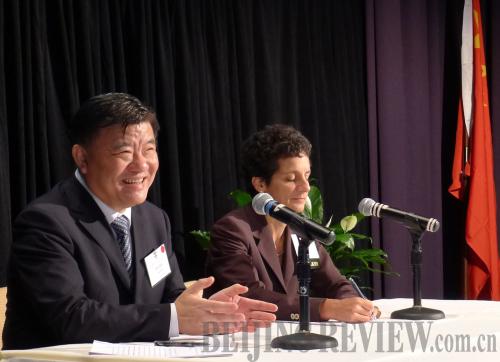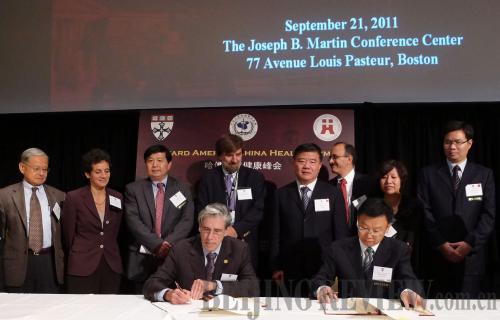|
 |
|
TO THE POINT: China's Minister of Health Chen Zhu (left) answers questions raised by the audience at the inaugural Harvard America-China Health Summit organized by the Harvard School of Public Health China Initiative in Boston on September 21-22 (CHEN WEN) |
Chinese people's personal medical expenses have been significantly lowered in the past decade due to increased government and social investment in health, said a top Chinese health official.
Chinese people's out-of-pocket expenditures accounted for around 36 percent of total health expenditures (THE) last year, dropping from nearly 60 percent in 2001, said China's Minister of Health Chen Zhu, at the inaugural Harvard America-China Health Summit held in Boston on September 21.
Over the last decade, the government share to THE has increased from around 16 percent to 29 percent and the social expenditure share covering basic medical insurance premiums has rose from 24 percent to 36 percent, "indicating a continual government investment in health and the cost-sharing role of health insurance," Chen told an audience of nearly 600 people from China and the United States, including policymakers, experts and leaders from non-governmental public health organizations and the healthcare industry.
With the advancement of Chinese healthcare reforms initiated in 2009, Chen said that the out-of-pocket ratio will be further reduced to around 30 percent or lower by 2015, the end of China's current 12th Five-Year Plan (2011-15). According to Chen, this is a "crucial" period of time for Chinese healthcare reform since it is a time of rapid change in many aspects of the country's economy and society, including aging demographics and a shifting healthcare mode.
According to Chen, the overall goal for the healthcare reform is "to establish a basic healthcare system and achieve primary healthcare for all by 2020." Currently, about 1.27 billion Chinese people, or 95 percent of the country's total population, are covered by the basic health insurance, up from 15 percent in 2000.
Chen said that China's healthcare reform has been carried out in line with the country's national conditions as a big developing country with the world's largest population.
Chen also pointed out that there are still problems pending in China's healthcare system, such as insufficient resources, ever increasing medical costs and large gaps in basic medical services between rural and urban areas, between different regions, and between different segments of the population.
Deepening reform is the solution to the problems, Chen said. The government shall have firm political will, strong leadership and an implementation mechanism, Chen said. "The government shall take the dominant role in protecting the health of its citizens," he added.
 |
|
SIGNING MOU: Ren Minghui, director of international cooperation at China's Ministry of Health (MOH) (right) and Professor Julio Frenk, dean of the Harvard School of Public Health (HSPH) (left), sign a Memorandum of Understanding on the collaboration between the MOH and HSPH on the sidelines of the inaugural Harvard America-China Health Summit held in Boston on September 21-22 (CHEN WEN) |
The two-day summit was hosted by the Harvard School of Public Health (HSPH) China Initiative with the support of the Chinese Ministry of Health and the United States Department of Health and Human Services, as part of an official agreement under the auspices of the China-U.S. Economic and Strategic Dialogue. The forum covered a wide range of topics, including healthcare reform, and frontiers in public health, medicine, and technology.
One of the main purposes of the summit is to provide a platform for discussions and exchanges of ideas on the challenges and opportunities in the health sector in both countries, said Liu Yuanli, director of the HSPH China Initiative, which was established in 2005 in collaboration with the Chinese Ministry of Health and Tsinghua University, to help China effectively address major issues in healthcare sector development through research and education.
(Reporting from Boston) | 